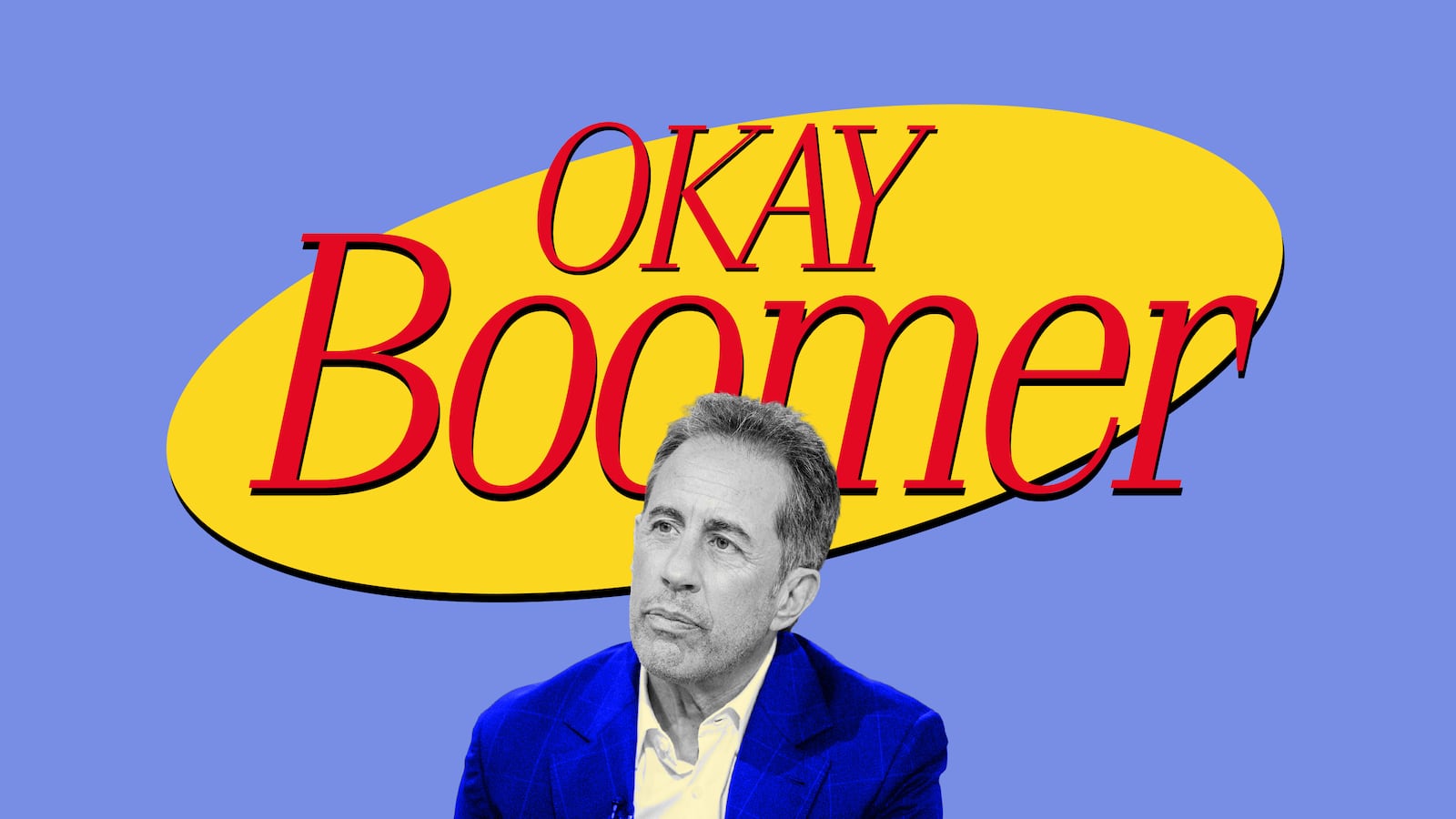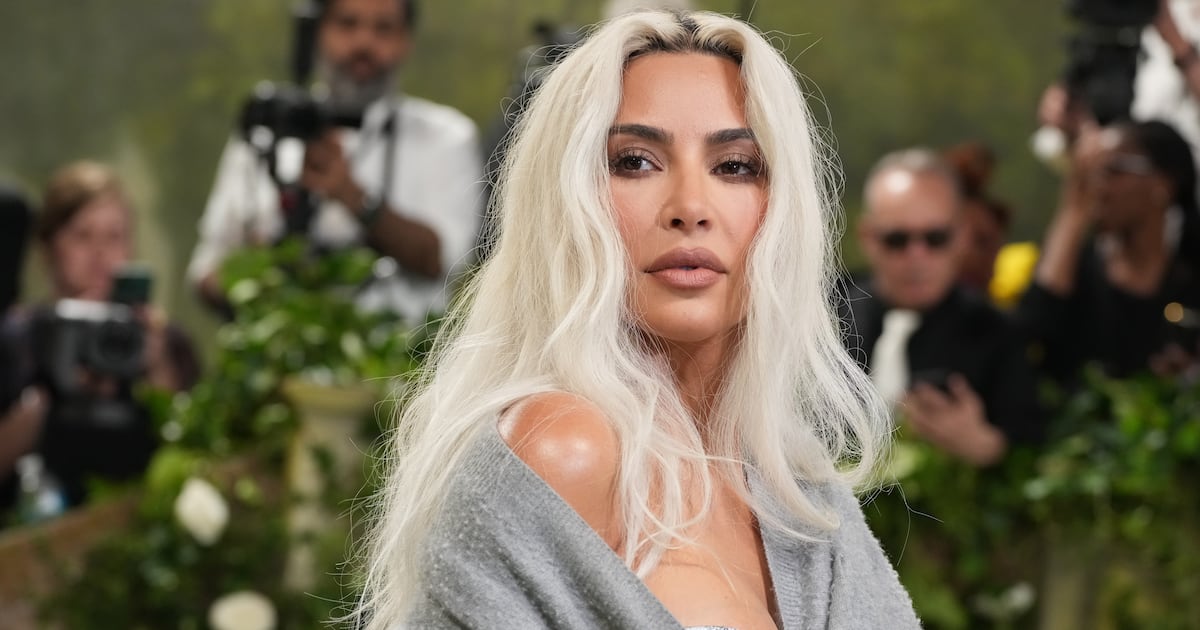All week long, feathers have been ruffling, hives of bees were buzzing in bonnets, and a record number of bears were being poked, all while social media hosted unprecedented amounts of tizzies. “What’s the deal?” you might say in response to that, which would be apropos considering that the source of the online hubbub is the maven of that catchphrase himself, Jerry Seinfeld.
The comedian spoke to The New Yorker’s David Remnick in an article published earlier this week. In the wide-ranging interview, he decried that there’s a scarcity of good comedy on TV to comfort people after a day of ingesting the troubling news of the world.
I’m impressed with the lengths Seinfeld went to prove his point, going so far as to direct, co-write, and star in Unfrosted, a tediously bland “comedic” take on the origin of the Pop-Tart, enlisting dozens of his industry friends to propagate this new age of unfunny.
But Unfrosted is not the source of the discourse surrounding Seinfeld’s comments—it only premiered Friday on Netflix. It’s what he blames for his observed comedy drought that’s causing a stir.
“It used to be, you would go home at the end of the day, most people would go, ‘Oh, Cheers is on. Oh, M*A*S*H is on. Oh, Mary Tyler Moore is on. All in the Family is on,’” he told The New Yorker. “You just expected, there’ll be some funny stuff we can watch on TV tonight. Well, guess what—where is it? This is the result of the extreme left and P.C. crap, and people worrying so much about offending other people. Now they’re going to see standup comics because we are not policed by anyone.”
There it is! Boomer comedian blames “extreme left” and “P.C. crap” for not being able to make edgy jokes anymore. If Tim Allen mentions “the woke mob” by the end of the day, I win this week’s pop-culture Bingo.
Seinfeld also cited storylines from Seinfeld and episodes of Curb Your Enthusiasm that he thinks could not be made today because of politically correct preciousness.
Cauldrons of reactions bubbled over in predictable ways from respective corners of the internet. There were the eye rolls over yet another rant about how younger generations can’t take a good joke, when maybe it’s the talent themselves who aren’t intelligent to evolve their comedy. The usual suspects—the deluded who believe that cancel culture is a thing that actually exists—rallied around their Jer Bear. “Make comedy legal again!” Elon Musk posted on X.
Mostly, though, the exasperation with the whining is that the argument is demonstrably untrue.
Abbott Elementary, Ghosts, and Young Sheldon are huge hits. Girls5Eva is hilarious. And an argument that edgy, provocative, politically incorrect comedy has gone extinct is laughably debunkable. The timing of Seinfeld’s comments is wild when Curb, from one of Seinfeld’s co-creators, is still receiving applause for its last season. Veep won roughly 400 Emmys, and it had scenes like this. The Righteous Gemstones thrives in the ribald.
Hacks returns this week, firing sharper, funnier, and naughtier than ever. Here’s one of my favorite jokes from it (be sure to click through both slides):
The Other Two was maybe the coolest show on TV when it aired, mostly because people couldn’t stock enough beverages in their homes for the amount of spit-takes it elicited over its un-P.C. storylines, like this one:
Then there’s the long, popular runs of Family Guy (22 seasons), South Park (26 seasons), and It’s Always Sunny in Philadelphia (16 seasons), which are still airing. Seinfeld mentioned a plot in which Kramer started a business where homeless people pulled rickshaws because “they’re outside anyway” as something that wouldn’t fly today. It’s Always Sunny fans have taken to social media to raise Seinfeld’s rickshaw with Sunny’s Catholic priest-turned-drug-addicted pimp, among myriad other storylines. Even co-creator Rob McElheney weighed in.
Then there’s the “seriously, this again?” of it all.
Listen, I discovered today that the allergy medication I’ve been taking all week to combat my apparent physical hypersensitivity to “nice weather” and “being outside” expired in 2020. Perhaps the side effect of consuming is extreme bouts of déjà vu.
These complaints from veteran comedians seem to surface like cicadas with accelerated R.E.M. cycles, and the backlash is reliably the same: There’s been no death of comedy. There’s a bitterness over a new taste level that’s popular, one that requires a modicum of evolution and effort to think a little differently.
What’s personally amusing to me about Seinfeld’s particular grievance is that the series he mentions as comedy comfort in the past—All in the Family and M*A*S*H—were known for being thorny and uncomfortable, actually. They challenged audiences’ political sensibilities and social mores. Seinfeld, on the other hand, was a famously apolitical show, whereas current comedy series, from Abbott Elementary to It’s Always Sunny, riff on things like race, gender, sexuality, and class in most episodes.
I do empathize with Seinfeld and think everyone should read his full interview, because he has smart insight into how a modern comedian navigates the changing line of what is and isn’t acceptable. To give grace where it’s due: I’m often caught eliciting a heavy sigh when told what’s not “OK” to say or joke about anymore. But the exhale isn’t resignation; it makes room for a rejuvenation, the energy and thrill of making things smarter, better, and, because of that, funnier. There’s no heroism in this. It’s what the field of comedy is, and so many of the most successful people in the business do it all the time.
I can imagine that, with those comments, Seinfeld thought he was swinging a wrecking ball at concrete walls that he feels have been built around freedom of comedy, but really was just firing a tiny BB gun at it. And, to his surprise, the pellets sailed right through anyway because, as the discussion this week proved, those walls are invisible.






